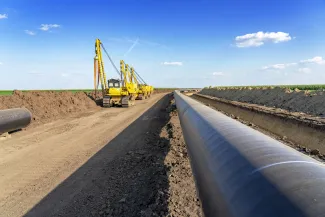
North Dakota law at center of carbon pipeline fight now under scrutiny
Click play to listen to this article.
(Prairie News Service) A North Dakota lawmaker is calling into question a state law change that drew a lot of attention this week.
At issue is a regulatory decision for a planned underground pipeline to store carbon dioxide. North Dakota's Public Service Commission said local ordinances to set route restrictions for such of projects are preempted by state rules.
At least two counties have adopted ordinances for a pipeline proposed by Summit Carbon Solutions. The company wants to transfer carbon dioxide from ethanol plants and store it underground in North Dakota.

Rep. SuAnn Olson, R-Baldwin, wonders whether recent changes to the law tied to the decision should be in place anymore.
"It was never envisioned, I'm sure, to be this far-reaching," Olson contended. "No doubt the PSC, all they can do is wrestle with what the current Century Code said. What it said to me is that the Legislature really needs to look at that, this next session."
The Legislature is not expected to meet again until next year, and Olson could not speak to whether a special session is necessary. Public hearings on the latest permit proposal from Summit could begin several weeks from now. The company said the project would have several benefits, including environmental. But skeptics are dubious about the claim and cited worries about safety and landowner rights.
Summit has argued the local ordinances are unreasonably restrictive, and contended it will use strong safety measures. But Olson, who represents an area along the proposed route, does not feel reassured.
"If there is a breach, this pipeline is near so much population -- or has the ability to touch so many people -- that the route they're proposing, north of Bismarck, is untenable, in my view," Olson asserted.
After its initial permit application was denied by North Dakota regulators, the company submitted a new plan to reroute almost 10 miles north of Bismarck city limits. Summit noted it addresses concerns about city growth and future development. Meanwhile, an attorney representing landowners fighting the project said his team plans to appeal the Public Service Commission decision.

















